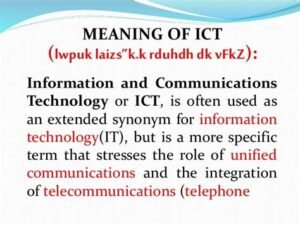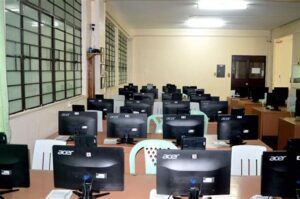Back to: Computer Studies JSS1
Welcome to class!
In today’s class, we shall be talking about the meaning of ICT. Please enjoy the class!
ICT Application in Everyday Life – Meaning of ICT
In today’s rapidly evolving digital world, the term “ICT” has become ubiquitous. It’s an acronym that stands for Information and Communications Technology, encompassing a broad range of tools and technologies that enable the creation, processing, storage, transmission, and exchange of information. ICT has transformed the way we live, work, and communicate, profoundly impacting nearly every aspect of modern society.
Key Components of ICT

ICT encompasses a diverse array of technologies, including:
Computing hardware: This refers to the physical components of computers, such as processors, memory, storage devices, and input/output devices.
Software: This includes the programs and applications that run on computers, enabling various functions like data processing, communication, and entertainment.
Networking: This involves the infrastructure and protocols that connect computers and other devices, allowing them to share information and resources.
Telecommunications: This encompasses the technologies that transmit information over long distances, including telephone lines, wireless networks, and satellite systems.
Applications of ICT

ICT has permeated almost every sector of society, with a wide range of applications, including:
Education: ICT has revolutionized education through e-learning platforms, online resources, and interactive learning tools.
Healthcare: ICT has transformed healthcare by enabling electronic health records, telemedicine, and diagnostic imaging.
Business: ICT has streamlined business operations through enterprise resource planning (ERP) systems, supply chain management, and e-commerce.
Government: ICT has enhanced governance by facilitating citizen services, online tax filing, and public communication platforms.
Entertainment: ICT has revolutionized entertainment through streaming services, social media, and video games.
Impact of ICT on Society
ICT has had a profound impact on society, bringing about both positive and negative changes:
Positive Impacts:
- Enhanced communication and connectivity: ICT has enabled instant global communication and collaboration, breaking down geographical barriers.
- Access to information: ICT has democratized access to information, empowering individuals with knowledge and resources.
- Improved productivity and efficiency: ICT has streamlined processes, reduced costs, and enhanced productivity in various sectors.
- Innovation and economic growth: ICT has fueled innovation and entrepreneurship, driving economic growth and development.
Negative Impacts:
- Digital division: Unequal access to ICT can exacerbate social and economic inequalities.
- Privacy concerns: The collection and use of personal data through ICT raise privacy and surveillance concerns.
- Addiction and dependency: Excessive ICT use can lead to addiction, social isolation, and mental health issues.
- Environmental impact: The production and disposal of ICT devices can have negative environmental consequences.
ICT has become an indispensable tool in the modern world, shaping our lives in ways that were unimaginable just a few decades ago. It is crucial to harness the power of ICT responsibly, addressing the challenges it poses while maximizing its benefits for society. As we move forward, ICT will continue to evolve, transforming the world in ways we can only begin to imagine.
We have come to the end of today’s class. I hope you enjoyed the class!
In case you require further assistance or have any questions, feel free to ask in the comment section below, and trust us to respond as soon as possible. Cheers!
Question Time:
- What is the difference between information technology (IT) and information and communications technology (ICT)?
- What are the key components of ICT infrastructure?
- How does ICT impact the flow and exchange of information?
- How has ICT transformed communication and collaboration in the modern world?
- What are the ethical considerations surrounding the use of ICT?
